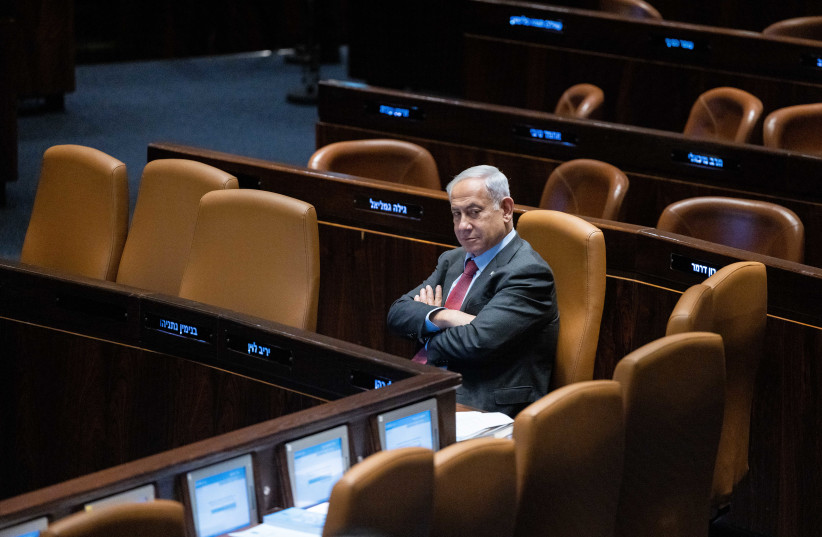MK Yuli Edelstein will not be allowed to propose private bills, raise topics for discussion or speak in the Likud’s name in the Knesset plenum for the next three weeks due to his intentional absence from Monday night’s judicial reform vote, coalition whip and Likud faction head Ofir Katz said Tuesday.
Edelstein was absent from the Knesset plenum during the voting sessions – something that Prime Minister Benjamin Netanyahu had reportedly known about in advance – to protest the continuation of the legislative process without broad consensus. He was the only Likud MK to do so.
Despite his absence, the reform bill on judicial review, including the override clause, passed its first reading in the Knesset plenum after midnight on Monday.
Officially an amendment to Basic Law: The Judiciary, the bill proposes that the High Court of Justice will have the power to strike down a law if it directly contradicts a Basic Law, but only with an 80% majority out of the full bench (12 out of 15 judges).
A second provision says the Knesset may insert an “override clause” into a law, and the law applies even if it contradicts a Basic Law. The High Court cannot hear an appeal against such a law.
The bill passed its first reading in a 61-52 vote. The law requires a full Knesset majority of 61 votes (as opposed to a majority of legislators present) since it is an amendment to a Basic Law.

Edelstein’s absence was significant, as it gave the Likud a scare because if one more MK would have been absent, the bill would have been toppled. Out of the coalition’s 64 members, Justice Minister Yariv Levin was also absent due to the death of his father earlier this week, and Defense Minister Yoav Gallant was absent for reasons related to his role.
Incapacitation Law passes first reading in Knesset
Katz’s “Incapacitation Law” passed a first reading earlier in the evening as well.
This bill blocks the attorney-general from declaring a prime minister “incapacitated.” It says prime ministers may only be removed from their position if they are physically or mentally incapable of serving. If such a prime minister does not step down on his or her own, a 75% cabinet majority may announce this. If the prime minister refuses, a 75% Knesset majority (90 MKs) may authorize the leader’s removal.
The law is intended to bypass an appeal currently before the High Court to require that the attorney-general declare Netanyahu incapacitated for violating a conflict-of-interest agreement relating to his ongoing criminal trial.
At least two other controversial bills are expected to proceed in the Knesset on Wednesday: the “Deri Law 2” and the “Gifts Law.”
“Deri Law 2” is an amendment to Basic Law: The Government that aims to bar the High Court from intervening in ministerial appointments. The bill is designed to enable Netanyahu to reappoint Shas MK Arye Deri after the court struck down his appointment, deeming it “extremely unreasonable” due to repeated criminal convictions and attempts to mislead it. The law is likely to pass its first reading in the Knesset plenum on Wednesday.
The “Gifts Law” would enable the prime minister to receive funding for medical and legal purposes, including the approximately NIS 4 million that has been raised via crowdfunding to pay his legal fees. The bill will likely be prepared for its first reading on Wednesday, and arrive at the plenum for a vote next week.
Preparatory discussions for the final readings on the judicial reform bill regarding the Judicial Selection Committee began on Tuesday in the Constitution, Law and Justice Committee.
Committee chairman Simcha Rothman (Religious Zionist Party) said the panel was engaged with refining some points of the bill, which includes provisions restricting the High Court from engaging in judicial review of Israel’s quasi-constitutional Basic Laws.
“We are engaged in refining two main points in the bill: the composition of the Judicial Selection Committee and the question of what makes a law a Basic Law,” he said. “What protections do we need to put on this stage for Basic Laws in the face of judicial review.”
Currently, there is no special method for introducing Basic Laws other than calling legislation a Basic Law.
Besides the restriction on judicial review, the main provisions of the bill would change the Judicial Selection Committee’s composition to remove Bar Association representatives and replace them with another cabinet minister and the Law Committee chairman.
Its critics say this would provide the coalition with an automatic majority and control of the judiciary through the panel. Its proponents say nonelected officials and judges should not be self-selecting.
Rothman decries state of public discourse over judicial reform
Rothman decried the state of public discourse over the judicial reform. He said it was problematic that the reform was being framed as a threat to democracy and human rights.
“If there is a Knesset that wants to enact terrible laws against groups, this bill will not be the one to enable this,” Rothman said. “What will help is a culture of parliamentary discourse. The most basic right in a democracy is that everyone has a voice.”
President Isaac Herzog worked to create a dialogue between the coalition and the opposition by meeting with a group of economic leaders to discuss his negotiation dialogue. He is expected to present his outline in the coming days.
The debate in the committee was cut short due to discussion and votes on a coronavirus debt insolvency law.
